In today's competitive business landscape, companies are constantly seeking innovative strategies to drive growth and increase revenue. One such strategy that has proven to be indispensable is lead generation. Understanding lead generation meaning and its implementation can significantly enhance a company's ability to attract and convert potential customers into loyal clients.
Lead generation refers to the process of identifying and cultivating potential customers for a business's products or services. It involves a range of marketing activities aimed at capturing the interest of prospects, nurturing relationships with them, and ultimately converting them into paying customers. The goal is to create a pipeline of leads that can be followed up on and developed into sales opportunities.
The lead generation process begins with attracting the right audience. This can be achieved through various channels, including digital marketing, social media campaigns, content marketing, search engine optimization (SEO), email marketing, and paid advertising. By creating compelling and relevant content, businesses can draw the attention of their target audience and encourage them to engage with their brand.
Once a potential lead shows interest, the next step is to capture their information. This is typically done through lead capture forms on websites, landing pages, or pop-ups that request details such as name, email address, and phone number. Offering valuable resources like eBooks, whitepapers, or free trials in exchange for contact information is a common tactic to entice visitors to share their details.
After capturing lead information, the focus shifts to nurturing these leads. This involves providing them with relevant and timely content that addresses their needs and challenges. Automated email sequences, personalized communication, and targeted content can help keep the leads engaged and guide them through the buyer's journey. The nurturing phase is crucial as it builds trust and credibility, increasing the likelihood of conversion.
Understanding lead generation meaning also encompasses the use of technology and tools to streamline and optimize the process. Customer Relationship Management (CRM) systems play a vital role in managing and tracking leads. These systems allow businesses to store lead information, track interactions, and monitor the progress of leads through the sales funnel. Marketing automation platforms further enhance efficiency by automating repetitive tasks, segmenting leads based on their behavior, and delivering personalized content at scale.
One of the key benefits of effective lead generation is the ability to generate high-quality leads that are more likely to convert into customers. By focusing on attracting individuals who have expressed genuine interest in a company's offerings, businesses can allocate their resources more efficiently and achieve higher conversion rates. This targeted approach not only boosts sales but also improves the return on investment (ROI) of marketing efforts.
Moreover, lead generation provides valuable insights into customer preferences and behaviors. Analyzing data from lead generation activities can help businesses understand which marketing strategies are most effective, identify trends, and make informed decisions to optimize future campaigns. This data-driven approach enables continuous improvement and ensures that marketing efforts are aligned with customer needs and expectations.
In conclusion, lead generation is a fundamental aspect of modern marketing that drives business growth by identifying and converting potential customers. By grasping the lead generation meaning and leveraging appropriate strategies and tools, businesses can attract, nurture, and convert leads effectively. This not only boosts sales but also builds long-term relationships with customers, fostering loyalty and sustained success.
